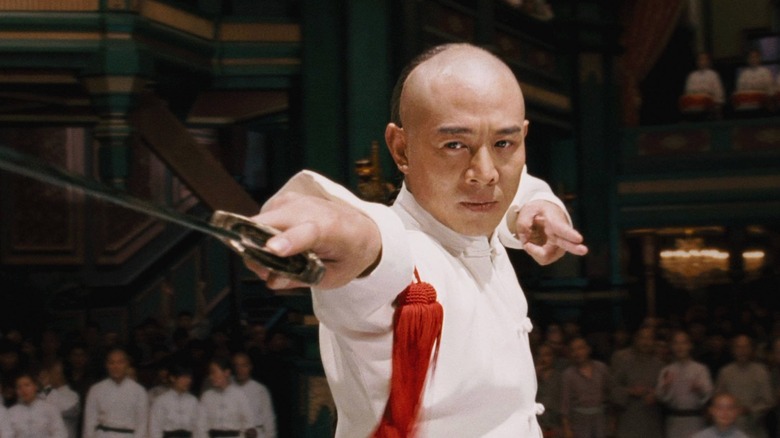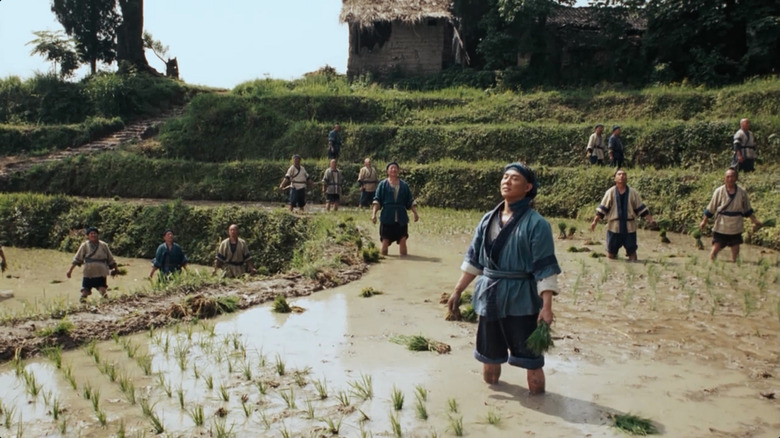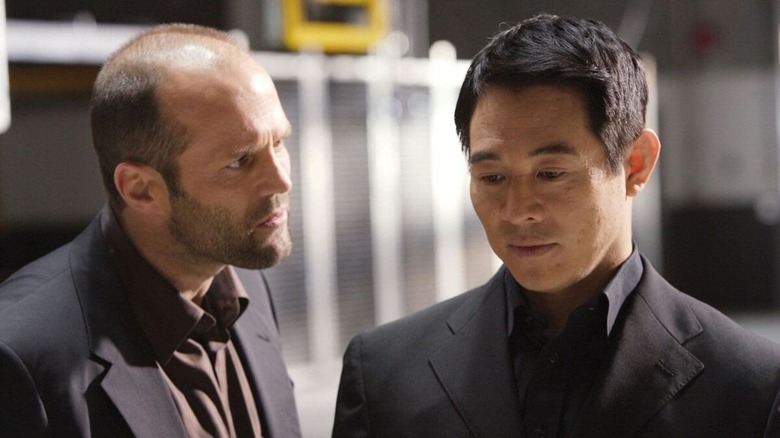Why Jet Li Wanted Fearless To Be His Last Martial Arts Movie
As a legendary Wushu champion and actor, Jet Li has played a notable number of Chinese martial arts and folk heroes. Some of his most well-known portrayals include Master Wong Fei Hung in the "Once Upon a Time in China" films and his "Fong Sai Yuk" series. When Li finally broke into the international scene with an appearance as the villain in "Lethal Weapon 4," an entirely new style of action films opened to the actor.
Throughout Li's career there's always been this distinction between the types of fighting he does in his films. It's what separates his roles in Wushu tales like "Hero" from say "The One" or "The Expendables." Which is why it probably came as a shock when Li announced in 2006 that his latest film "Fearless," based loosely off the life of Huo Yuanjia, would be his final Wushu movie. No more martial arts movies from the man who effectively helped the genre smash box-office records across China. But Li's reasoning for ending it all had a lot to do with just how much he revered the message of "Fearless."
For Li Fearless represented Wushu's final-phase
Although elements of Huo's life are greatly exaggerated, the liberties Li and director Ronny Yu take are not without purpose. The arc of Huo's journey from champion fighter to disgraced outcast is a tragic one catalyzed by his irascible itchy fist. It takes the loss of his mother and daughter to realize the error of his vengeful tendencies — coupled with a long exile in which he relearns the necessity of kindness. Li explained to Cinema Blend one of the central themes of "Fearless" was this idea that a true Wushu master could make physical violence obsolete:
"It's the last Wushu movie. That's it, because Wushu has many levels. Just to make it easy to understand, maybe three levels. First level is the physical contact. Use your physical skill against your enemy. That's most action films doing this kind of genre. The second level is use your knowledge, languages, strategy, everything you could before physical contact to stop your enemy. Third, use your honor, belief, your love, show to your enemy. Turn your enemy into your friend. I tried to share those three levels in the movie. Everything I believe, the physical part, the mental part, I put everything in the film. That's why I say this is my last Wushu movie."
When Huo returns home his actions start to become emblematic of Li's description of Wushu's final level. After making amends with those he's wronged he becomes a national hero in China via a series of staged competitions against foreign fighters. In at least two instances, against American wrestler Hercules O'Brien and in his final match with Japanese champion Tanaka, Li as Huo also chooses to respectively save and spare his opponent. Even before his fight with Tanaka, he wins over his would-be enemy over tea and the two become quick friends.
But the actor's explanation of Wushu's final level is crystallized for me in just a few seconds in the film's final moments: In the smile Huo gives Tanaka when he withholds what would've been a fatal punch before falling backwards and succumbing to his nefarious poisoning by the foreign chamber of commerce. Huo's punch is a fitting metaphor for Wushu: demonstrating his physical prowess without inflicting physical violence, transforming his opponent into an ally.
Li's career after Fearless
Since the release of "Fearless" Li has continued to unsurprisingly appear in films. There's his rightfully recurring role in "The Expendables" series — which, despite being viewed as a kind of "Fast & Furious" for action movies, exists nonetheless as a kind of pantheon of modern action star icons. As Li further explained in his interview with Cinema Blend, just because the actor had decided to stop doing Wushu movies didn't mean audiences would be robbed of seeing him use his skills against willing stuntmen:
"In the future, I will continue to do acting or do some kind of movie. Like a few months ago I did a movie [War], FBI, cops, fight with mafia gangsters. Of course, this kind of genre, you have a car chase, gunshots, people fighting on the street, but I never know if this is a Chinese punch or American punch. Or the leg is Japanese or something. Just two arms, two legs, physical contact. It doesn't mean martial arts because I think it's just action in the film to develop the character, to help the story."
"War" saw Li reunited with fellow butt-kicker Jason Statham, their first film together was "The One," and though the film struggled at the box-office it more than recouped when released to video. The benefit of Li's comfortable distinction between Wushu films and stereotypical action movies is that he can continue enjoying acting in one without degrading the messages of the other.
Interestingly enough though, "Fearless" wasn't technically Li's final Wushu movie. In 2011 he appeared in the Tsui Hark directed film "Flying Swords of Dragon Gate," a remake of the Taiwanese Wushu film "Dragon Inn," which had already been remade once in 1992 as "New Dragon Gate Inn" and starred "Hero" actors Donnie Yen and Maggie Cheung. Li's reasoning for joining the film revolved around the fact that it would be the first time 3D would be used in a Wushu film — so one can hardly blame the actor for wanting to experiment with a technology that was all the rage in the film industry less than a decade ago.


